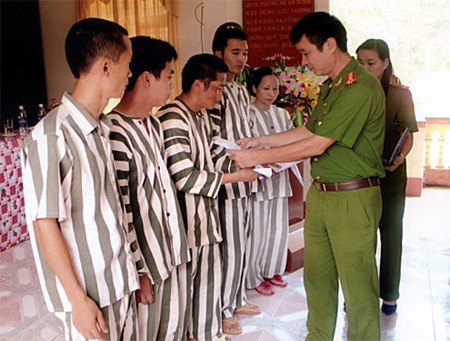(VOVworld) – Amnesty is a major policy of the Vietnamese State which is launched on major national celebration days. To prepare for this year’s amnesty, functional agencies are finalizing procedures to give lawbreakers opportunity to return to normal life.

Prisoners received amnesty decision (Photo: VGP) |
Hong Ca prison in Tran Yen district, Yen Bai province, houses more than 2,000 inmates. On the occasion of National Day, many of them are anxiously waiting for the President’s amnesty announcement. Inmate Tran Doan Sinh is on the list of the prison’s amnesty proposal. “When I received a 5-year sentence, I was very sad. With the encouragement and teaching of the prison’s officials, I realized my wrong doing and wanted to correct myself. I have tried wholeheartedly to fulfill assigned tasks with a hope to be pardoned at the earliest time to reunite with my family. I always keep in mind that when I’m home, I’ll bring my children up so they will never fall into to my misguided track.”
Hong Ca prison has strictly implemented the State regulations on amnesty including conditions for amnesty and meetings with inmates to review their cases and select eligible persons. The proposed list of 132 candidates for amnesty has been agreed to by all the prisoners.
After the issuance of the President’s decision on amnesty and instructions of the Central Amnesty Advisory Council, leaders of Yen Ha prison in Phu Yen district, Son La province, have launched specific activities to ensure that well-behaved prisoners will benefit from the State policy of leniency. Yen Ha sent 81 dossiers of prisoners to the Central Amnesty Advisory Council for this year’s National Day. Senior Lieutenant-colonel Pham Xuan Nghiep is the Yen Ha prison warden. “During the selection, we ensured that all prisoners were informed by publicizing all amnesty criteria and regulations. They knew and understood the criteria. Many of them claimed that they were eligible for amnesty while others withdrew their names from the list saying they were not qualified. We have carried out all procedures in line with the law in a democratic, transparent, and public manner.”
Inter-sector groups will assess and compare the original files of the prisoners with the proposal dossiers. Members of the Central Amnesty Advisory Council will come to the prisons to review the dossiers. The People’s Procuracy will also closely scan the proposed dossiers before submitting them to the President for a final decision. Deputy Prime Minister Nguyen Xuan Phuc is Chairman of the Central Amnesty Advisory Council. “Amnesty is the State’s special lenient policy for imprisoned criminals who show signs of repentance and actively improve themselves to become useful citizens. Amnesty illustrates the national tradition of leniency for imprisoned criminals. Amnesty must be implemented in line with the law to guarantee democracy, objectivity, fairness, and avoid negative publicity. We must ensure internal and external requirements and national security and defense.”
Amnesty is Vietnam’s humane policy in fighting crime. Since 2009, Vietnam has organized 4 amnesties in which 48,000 inmates were granted early release including a number of foreigners in prison for violating Vietnamese law. The amnesty has been applauded domestically and internationally. 30% of all prisoners have received pardons and less than 1% of them have returned to crimes. These rates demonstrate the correctness and effectiveness of the policy.